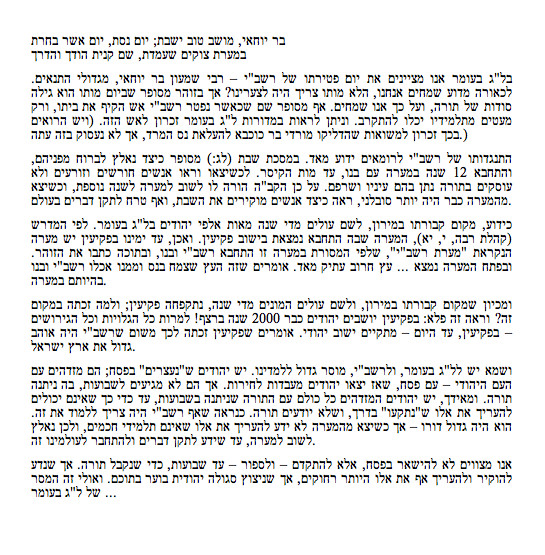Torah
94 results total, viewing 11 - 20
|
On Lag Ba`omer we mark the Yahrtzeit of Rashbi (Rabbi Shimon Bar Yochai). Although his gravesite is in Meiron, the cave in which he hid from the Romans is in Peki`in, and according to tradition, can still be seen there today. But there’s a very important message to be learnt from Rashbi and his sojourn - and exit - from the cave ...
more
By Rabbi Noam Himelstein
|
4/25/13
|
|
Our underlined phrase, “you shall judge your fellow with righteousness,” is found in the second of the two parshiot we read this Shabbat. As noted in Talmud Bavli, Shevuot 30a, one of the interpretations of this expression is the obligation to judge our fellow Jews in a favorable fashion: “Our Rabbis taught: ‘You shall judge your fellow with righteousness’ - judge your neighbor to the side of merit (Hevay dan et chaverchah l’kaf zechut).”
more
By Rabbi David Etengoff
|
4/18/13
|
|
The untimely and completely supernatural death of Nadav and Avihu serves as one of the focal points of this week’s parasha. Nadav and Avihu were the sons of Aharon and Elisheva: “Aaron took to himself for a wife, Elisheba, the daughter of Amminadab, the sister of Nahshon, and she bore him Nadab and Abihu, Eleazar and Ithamar.”
more
By Rabbi David Etengoff
|
4/4/13
|
|
Rebbe Avraham Yehoshua Heschel sat at a book laden table, deeply immersed in his studies, surrounded by eager students, who absorbed every word. Suddenly, he lifted his head, leaned back in his chair, and smiled. “I don’t remember if I have told you this Pesach story before, but it is good to retell the story of Eliyahu’s cup before Pesach.”
more
By Rabbi Eugene, z”l, and Dr. Annette Labovitz
|
3/21/13
|
|
You [Moshe] shall make a washstand (kiyor) of copper and its base of copper for washing, and you shall place it between the Tent of Meeting and the altar, and you shall put water therein. (Sefer Shemot 30:18)
And he [Bezalel] made the washstand (hakiyor) of copper and its base of copper from the mirrors of the women who had set up the legions, who congregated at the entrance of the tent of meeting. (Ibid. 38:8)
He [Moshe] placed the washstand (hakiyor) between the Tent of Meeting and the altar, and there he put water for washing.
more
By Rabbi David Etengoff
|
3/7/13
|
|
The fourteenth century poet, John Lyndgate, famously wrote an axiom about one’s inability to please all people all the time. Though this quote is often attributed to President Abraham Lincoln, its roots are much older; older even than Lyndgate in the 1300s. As it turns out, Megillat Esther sends the same message, and this idea frustrates people, like me, who try to make everyone happy.
more
By Dr. Jeffrey Ratz
|
2/21/13
|
|
Dedicated to the sacred memories of my mother, Miriam Tovah bat Aharon Hakohen, father-in-law, Levi ben Yitzhak, sister-in-law, Ruchama Rivka Sondra, sister, Shulamit bat Menachem, Shifra bat Chaim Alter, and Yehonatan Binyamin ben Mordechai Meir Halevi, and the refuah shlaimah of Yosef Shmuel ben Miriam and Moshe Reuven ben Chaya.
more
By Rabbi David Etengoff
|
2/8/13
|
|
The officers of the children of Israel saw them in distress, saying, “Do not reduce [the number] of your bricks, the requirement of each day in its day.” They met Moses and Aaron standing before them when they came out from Pharaoh’s presence. And they said to them, “May the L-rd look upon you and judge, for you have brought us into foul odor in the eyes of Pharaoh and in the eyes of his servants, to place a sword into their hand[s] to kill us.”
more
By Rabbi David Etengoff
|
1/3/13
|
|
This week’s parasha (Torah portion) contains a verse that seems to defy all manner of understanding: “Now Joseph’s brothers saw that their father had died…” (Sefer Bereishit 50:15, this and all Tanach and Rashi translations, The Judaica Press Complete Tanach). What can the Torah possibly mean when it tells us this?
more
By Rabbi David Etengoff
|
12/27/12
|
|
Jacob sent angels ahead of him to his brother Esau, to the land of Seir, the field of Edom. And he commanded them, saying, “So shall you say to my master to Esau, ‘Thus said your servant Jacob, I have sojourned with Laban, and I have tarried until now. And I have acquired oxen and donkeys, flocks, man-servants, and maidservants, and I have sent to tell [this] to my master, to find favor in your eyes.’” The angels returned to Jacob, saying, “We came to your brother, to Esau, and he is also coming toward you, and four hundred men are with him.” (Sefer Bereishit 32:4-7, this and all Tanach and Rashi translations, The Judaica Press Complete Tanach)
more
By Rabbi David Etengoff
|
11/29/12
|

 50.0°,
Overcast
50.0°,
Overcast 

